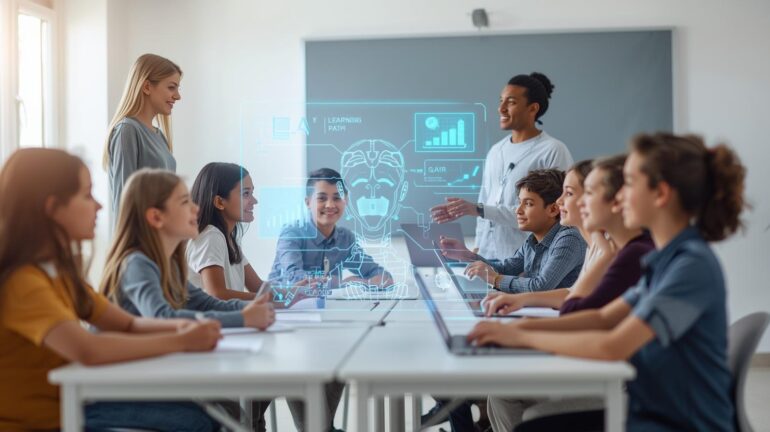
Education has always been shaped by technology, from the printing press to the internet. Today, Artificial Intelligence (AI) is poised to become the next major force reshaping how knowledge is delivered, absorbed, and measured. While the promise of AI in education is vast, one of its most compelling applications is personalized learning the ability to tailor teaching methods, pace, and content to the unique needs of every student. By moving away from one-size-fits-all classrooms, AI has the potential to redefine the future of education and make learning more inclusive, engaging, and effective.
At its core, personalized learning is about recognizing that no two students are the same. Some learn quickly through visuals, others prefer text, and many thrive with interactive, hands-on approaches. Traditional education systems, however, often lack the resources to cater to such diversity. AI bridges this gap by analyzing student data in real time such as performance on assessments, engagement levels, and learning preferences and then dynamically adjusting content. Platforms powered by AI can recommend additional practice for struggling students, offer advanced challenges to high performers, and suggest the best format for each learner.
Adaptive learning platforms exemplify this capability. Tools like intelligent tutoring systems and AI-driven courseware adjust difficulty levels based on student progress, much like a personalized coach. For example, if a student consistently struggles with algebraic equations, the system can break down concepts into smaller steps, provide extra examples, or switch to interactive visual aids. Conversely, students who excel can skip ahead to more advanced material, ensuring they remain engaged and challenged. This flexibility prevents both boredom and frustration, two key reasons students disengage from learning.
Beyond academics, AI also enhances teacher support. Educators spend significant time on administrative tasks grading, attendance, and lesson planning that limit their ability to focus on instruction. AI-driven tools can automate grading for objective assignments, generate tailored lesson plans based on class performance, and even predict which students may need additional support. This enables teachers to devote more time to mentoring, creativity, and building human connections that machines cannot replace. Far from sidelining educators, AI can empower them to be more effective and impactful.
AI is also democratizing access to quality education. In regions where teacher shortages are acute, AI-powered virtual tutors can provide round-the-clock assistance to students who would otherwise lack guidance. Language translation tools are breaking barriers for non-native speakers, while speech recognition software supports students with learning disabilities. In this way, AI is not just personalizing learning but also making education more equitable and accessible on a global scale.
The rise of immersive technologies augmented reality (AR) and virtual reality (VR) powered by AI is further transforming education. Imagine a history student exploring ancient Rome through a VR headset or a medical trainee practicing surgeries in a risk-free simulated environment. AI enhances these experiences by tracking student interactions and adjusting scenarios in real time, ensuring that learning remains both engaging and effective. These innovations move beyond rote memorization to foster critical thinking and experiential learning.
However, alongside the opportunities come significant challenges. Data privacy is one of the foremost concerns. AI systems rely on vast amounts of student data, from academic performance to behavioral patterns. Without strict safeguards, this information could be misused or compromised. Schools and policymakers must strike a balance between leveraging data for personalization and protecting student privacy.
Another concern is equity of access. While AI tools are flourishing in well-funded schools, students in under-resourced areas risk being left behind. Bridging the digital divide ensuring access to reliable devices, internet connectivity, and affordable AI-powered platforms will be crucial in ensuring that personalized learning does not become a privilege reserved for the few.
Moreover, AI cannot replace the human element of education. Empathy, encouragement, and the ability to inspire are qualities unique to teachers. Over-reliance on technology risks reducing learning to a transactional process. The most effective educational models will be those that integrate AI as a supportive partner while maintaining the irreplaceable role of human educators.
Looking forward, the impact of AI on education will depend largely on how it is implemented. With thoughtful design, robust privacy protections, and policies to ensure equitable access, AI has the potential to transform classrooms into adaptive, inclusive, and engaging environments. Students will no longer be limited by rigid curricula or teaching methods but will have pathways uniquely suited to their abilities, interests, and goals.
AI in education represents more than just technological progress it is a philosophical shift toward recognizing individuality in learning. By putting the student at the center, AI can unlock human potential in ways traditional systems never could. The challenge now is to harness this technology responsibly, ensuring that the future of education is not only smarter but also fairer, more compassionate, and truly designed for every learner.